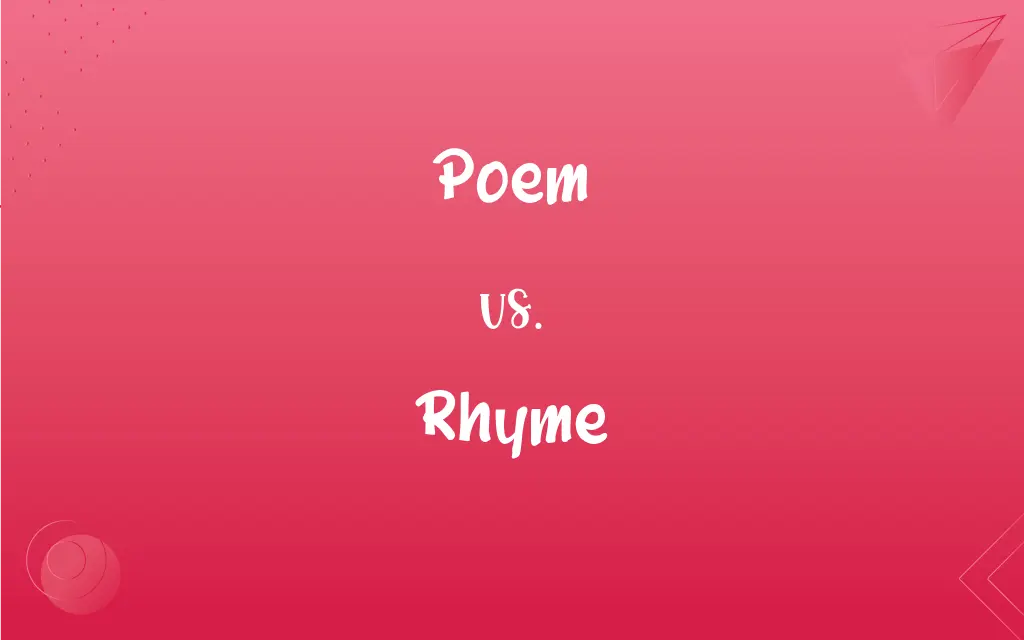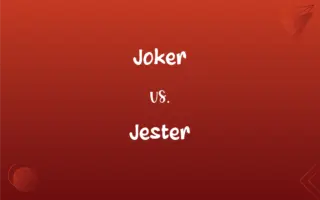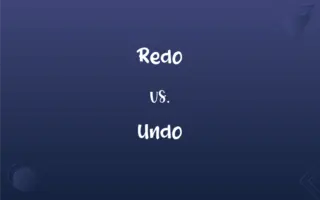Poem vs. Rhyme: What's the Difference?
Edited by Aimie Carlson || By Harlon Moss || Published on January 11, 2024
A poem is a literary work expressing ideas with style and rhythm, while a rhyme is a repetition of similar sounds in two or more words.

Key Differences
A poem is a form of literary expression that conveys emotions, ideas, or tells a story, often with a focus on rhythm and imagery. Rhyme, on the other hand, is a technique within poetry and other forms of writing where similar or identical sounds are repeated, often at the end of lines.
The essence of a poem lies in its ability to evoke emotions and thoughts through its structure, which may or may not include rhyme. Rhyme is a specific sound pattern, contributing to the auditory appeal of poems and other literary forms.
Poems can exist without rhyme, relying on other elements like meter, metaphor, and imagery to convey their message. Conversely, rhyme can be used outside of poetry, in songs, slogans, or prose, to add a lyrical quality or aid memory.
The purpose of a poem is often to reflect on personal or universal experiences, using various literary devices including, but not limited to, rhyme. Rhyme serves to create a rhythm or a pattern, making a poem or any text more memorable and engaging.
All rhymes can be a part of poetry, not all poems necessarily use rhyme. The distinction lies in the broader narrative and emotional scope of poems, compared to the specific auditory technique of rhyme.
ADVERTISEMENT
Comparison Chart
Definition
A literary work expressing ideas with style, rhythm, and often metaphor.
The repetition of similar sounds in two or more words, typically at the end of lines.
Purpose
To evoke emotions, convey ideas, or tell stories.
To create auditory patterns and enhance memorability.
Usage
Can be free-form or structured, with or without rhyme.
Used in poetry, songs, and slogans for rhythmic quality.
Structure
Varies widely, from free verse to strict forms like sonnets.
Typically involves matching end sounds in lines.
Independence
Can exist without rhyme, relying on other literary elements.
Often dependent on a larger text, like a poem or song.
ADVERTISEMENT
Poem and Rhyme Definitions
Poem
A poem is a piece of writing that partakes of the nature of both speech and song.
Her poem had a lyrical quality that captivated the audience.
Rhyme
Rhyme is the matching of sound in two or more words or phrases.
The rhyme in the couplet tied the ideas together seamlessly.
Poem
A poem is an arrangement of words containing meaning and musicality.
The musicality of the poem made it a joy to read aloud.
Rhyme
Rhyme is a tool used in poetry to create rhythm and uniformity.
The consistent rhyme pattern added a pleasing rhythm to the poem.
Poem
A poem is a composition in verse, often characterized by concentrated and heightened language.
The poem's intricate language evoked deep emotions.
Rhyme
Rhyme is the repetition of similar sounds in the final stressed syllables of two or more words.
The rhyme of 'time' and 'sublime' gave the sentence a musical quality.
Poem
A poem is a collection of spoken or written words that express ideas or emotions in a powerfully vivid and imaginative style.
The poem painted a vivid picture of the sunset.
Rhyme
Rhyme is a poetic device to enhance the musicality of a verse.
The clever rhyme made the verse catchy and memorable.
Poem
A verbal composition designed to convey experiences, ideas, or emotions in a vivid and imaginative way, characterized by the use of language chosen for its sound and suggestive power and by the use of literary techniques such as meter, metaphor, and rhyme.
Rhyme
Rhyme is a correspondence of sound between words, especially when these are used at the ends of lines of poetry.
The rhyme between 'moon' and 'June' is classic.
Poem
A composition in verse rather than in prose
Wrote both prose and poems.
Rhyme
Correspondence of sounds at the ends of words or phrases, especially when involving the last stressed vowel and all succeeding sounds in each of two or more such words or phrases.
Poem
A literary composition written with an intensity or beauty of language more characteristic of poetry than of prose.
Rhyme
A word that exhibits such correspondence with another, as behold and cold.
Poem
A literary piece written in verse.
Rhyme
A poem or verse employing such correspondence as a formal feature, especially at the ends of lines.
Poem
A piece of writing in the tradition of poetry, an instance of poetry.
Poem
A piece of poetic writing, that is with an intensity or depth of expression or inspiration greater than is usual in prose.
Poem
A metrical composition; a composition in verse written in certain measures, whether in blank verse or in rhyme, and characterized by imagination and poetic diction; - contradistinguished from prose; as, the poems of Homer or of Milton.
Poem
A composition, not in verse, of which the language is highly imaginative or impassioned; as, a prose poem; the poems of Ossian.
Poem
A composition written in metrical feet forming rhythmical lines
Poem
A poem is a form of literary art that uses aesthetic and rhythmic qualities of language.
The poem's rhythm and flow were mesmerizing.
FAQs
How does rhyme contribute to a poem?
Rhyme adds rhythm, musicality, and can help unify ideas in a poem.
What defines a poem?
A poem is a literary work expressing ideas with rhythm, style, and often metaphor.
Are there rules for creating a poem?
Poems can follow structured forms or be free-form, with no strict rules.
Are all rhymes part of poems?
No, rhymes can be used in other contexts like songs and slogans.
Can rhyme be used in prose?
Yes, rhyme can be used in prose to add a lyrical quality or for emphasis.
How do poets choose words for rhymes?
Poets consider sound, meaning, and the overall effect on the poem.
What is the purpose of rhyme in poetry?
Rhyme creates auditory patterns and enhances memorability in poetry.
Can a poem exist without rhyme?
Yes, poems can be written without rhyme, using other elements like meter and imagery.
How is rhythm different from rhyme in poetry?
Rhythm refers to the pattern of beats in a line, while rhyme refers to the repetition of similar sounds.
Can rhyme occur within a line of poetry?
Yes, this is known as internal rhyme.
How do modern poets view rhyme?
Modern poets may use rhyme flexibly, often experimenting with its form.
Is rhyme essential for a poem to be effective?
No, a poem's effectiveness depends on many factors, not just rhyme.
What are the different types of rhymes?
Types include end rhyme, internal rhyme, slant rhyme, and eye rhyme.
What is free verse in poetry?
Free verse is a form of poetry that does not follow regular rhyme or meter patterns.
What's the difference between end rhyme and internal rhyme?
End rhyme occurs at the end of lines, while internal rhyme occurs within a line.
Can a poem tell a story?
Yes, narrative poems tell stories through verse.
Can rhymes be imperfect or slant?
Yes, slant rhymes use similar but not identical sounds.
Do all cultures use rhyme in poetry?
Rhyme is common in many cultures, but not universal in poetry.
How can beginners start writing poems?
Beginners can start by reading various poems, experimenting with forms, and expressing their thoughts and feelings creatively.
What is an example of a poetic form that uses rhyme?
Sonnets and limericks are examples of forms that often use rhyme.
About Author
Written by
Harlon MossHarlon is a seasoned quality moderator and accomplished content writer for Difference Wiki. An alumnus of the prestigious University of California, he earned his degree in Computer Science. Leveraging his academic background, Harlon brings a meticulous and informed perspective to his work, ensuring content accuracy and excellence.
Edited by
Aimie CarlsonAimie Carlson, holding a master's degree in English literature, is a fervent English language enthusiast. She lends her writing talents to Difference Wiki, a prominent website that specializes in comparisons, offering readers insightful analyses that both captivate and inform.







































































